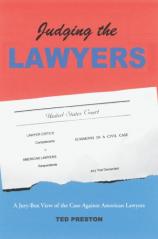Reading Group Guide
Discussion Questions
Judging the Lawyers: A Jury-Box View of the Case against American Lawyers

1. Does the case against the lawyers as presented in the book include what you think are the salient criticisms of lawyers? If not, what would you add? In which of the six counts does the critics’ argument make the strongest case against the lawyers? In which of the counts does the lawyers’ reply do the best job of explaining why the critics are mistaken?
2. The book asks you to assume the position of a juror, in order to "transcend a reader’s usual passive role" and "to be active and to think through each issue as a juror does." How did being placed in this position affect your interest in the book? Did the Judge’s reminders of the duty of a juror make a difference in your reactions to the arguments or your final conclusions about lawyers?
3. What conclusions does the trial leave you with concerning the possibility of a less partisan national conversation about a public issue such as the role of lawyers in America? Is the juror ideal too idealistic, or can it be held up as a reasonable standard?
4. The author, speaking through the Judge, makes an ending plea for "a greater deliberation that promotes good judgment and good adaptation of the legal system to the needs of the citizens and the republic." What conclusions do you draw concerning the respective roles of individuals and interest groups in the debate about lawyers and the civil legal system? Is it realistic to expect a more energized and less partisan public debate on such issues? Do you expect the Internet to play a helpful role in promoting better deliberation of matters such as tort reform, the asserted problems of medical malpractice litigation, etc.?
5. In asking for verdicts on each of the six counts, is it fair to impose the "preponderance of evidence" standard? What are the advantages and disadvantages of asking you to use this legal standard in your assessment of the issues?
6. For each of the counts you are asked to render your verdict as to whether the Complainants (the lawyer critics) have proven their case against the lawyers. For the counts where your group has a less than unanimous verdict, to what factors do you attribute the different individual verdicts?
7. At the end of the jury verdict form (found at www.judgingthelawyers.com), you are asked to describe the culture of American lawyers. Is there something different about lawyers and their practices that would make their culture different from that of other Americans? If so, identify what factor or factors would cause such a difference.
8. In Count 5 on "Greed", a primary defense is that lawyers are essentially the same as persons from other fields, and shouldn’t be criticized more than businesspersons for making good incomes. Critics would hold the lawyers to a higher standard, or ethic. Should they be held to such a higher standard, and who should set that standard, the lawyers themselves or the public? What, if any, role could nonlawyers play in regulating attorney conduct?
9. For each of the following counts, as set forth in Judging the Lawyers, do the Complainants prove their case by a preponderance of the evidence?
1. Is the American Legal System too large and too intrusive? Do we have too much law and too many lawyers?
2. Is America too litigious? Do American laws, judges and juries encourage excessive litigation?
3. Is America too litigious? Does attorney abuse in civil litigation promote excessive costs and deny justice?
4. The Lawyers’ professional culture: Does zealous advocacy on behalf of clients prevail over public duty?
5. The American lawyer as businessperson: Is the practice of law an ethical profession or one dominated by greed?
6. Justice for all: A realistic stand or an illusion? Does the civil legal system too often deny plain justice?
Judging the Lawyers: A Jury-Box View of the Case against American Lawyers
- Publication Date: April 18, 2007
- Paperback: 394 pages
- Publisher: iUniverse, Inc.
- ISBN-10: 0595422632
- ISBN-13: 9780595422630






